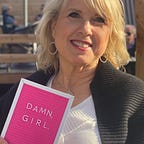I Prayed That a Visit From My Best Friend Would Jolt Me Out of My Depression
When I hugged her fiercely, I hoped that my embrace would say all the words that I could not
“Welcome to my prison,” I say to the woman who has been my very best friend since the third grade. I pull into the driveway and wave my hand toward my Spanish-style home.
The lavender wisteria wrapping around the front trellis is in full bloom and the fronds of baby palms that dot our walkway bow and sashay in the light spring breeze. Marilyn and I have just arrived from LAX. She is visiting from South Dakota in hopes of helping me out of the dark place I am in. My husband had called her, then sent an airline ticket.
As always, Marilyn showed up for me. She was like a beautiful apple: if you cut her open there would be no bruises or bad spots. Mar was sweet and strong, the one I had loved with my whole eight-year-old heart and whose love had grown up in me. She was the sister I’d never had — Mar was love, and kindness itself.
But I doubted even Marilyn could pull me out of the deep, cylindrical death spiral I was in.
It was dark and cramped in the space I inhabited, and there was room for only one. Depression is solitary — isolating is the psychological term most often used, as in the common therapist accusation, “Are you isolating?” Depression, as I experienced it, is anguish itself. It is the despair beyond despair, as the great novelist William Styron wrote in Darkness Visible, the bible of sorts for those who suffer from anxiety and depression.
It is the knowingness — which becomes your truth — that nothing, not one goddamn thing, will ever help you; that nothing will ever pierce the blackness of your existence. No hay otro remedio, there is no remedy as they say in my adopted country of Spain. The poet Lorca called it the land of todo o nada, all or nothing. From the flat morning’s first light until the darkness of night unfolds, the hopelessness of depression is utter and absolute.
“Watch your words, Di,” Mar warns me. I know she’s saying I shouldn’t refer to my home as my prison, because then I’d be a prisoner — or “behind bars,” as I learned to write as a journalist.
But what sticks with me is words.
Words had always been my friend. As a childhood poet and storyteller, I played with words; I loved them, and they loved me right back. I had used words as therapy for most of my life, filling the pages of innumerable notebooks — journaling my way out of adolescent angst and teen heartbreak — to the deeper challenges of womanhood: career, marriage, motherhood. Words had always been my light, my way. Words had given me my career, first as a journalist, and then as a publicist.
But not anymore. Like my career, words had been taken from me. I could not journal because the words no longer spilled out at will. Instead, each word dropped with a heavy thunk onto the page, stilted and spare, until they fell not at all.
“Di?” I heard an urgency in Marilyn’s voice; it mirrored that of my husband and mother, both of whom feared they were losing me. I got their fear, even as I continued to watch my sanity slip away. I realized I had just done it again, zoned out on Marilyn, become unreachable.
My husband often complained of my distance, my monosyllabic reality. “Where are you?” he would ask with that same urgent tone, at my seeming inability to carry on a conversation. Once a master at repartee, I now could not string two sentences together whether at home around the dinner table with my children or on the rare occasion that we were out together in the world.
Robbed of words, again, I thought darkly. But it wasn’t just words, I knew — it was deeper and wider. It was the loss of myself; first, it was my self-esteem soon followed by my self-worth, which ratcheted down to my current self-loathing. I hated myself. My crippling self-hate had led to my loss of self-reliance. Once confident and a leader, I was now an anxious, timid toddler, clinging to the hand of the adult I needed to survive.
“Let’s get you inside,” I said, getting out of the car. I was making a behemoth effort to escape my moribund thinking, and instead, put a lilt of enthusiasm into my voice. I moved to retrieve Marilyn’s black, bulging suitcase from the trunk. I was struggling in the attempt, and Mar came swiftly around the car to help me. Together, we hauled the bag out.
I realized, then, how happy I was Marilyn was standing here, right by my side, even though I could not feel it, feel anything but the eternal heaviness. And so, I turned and hugged her fiercely, my face pressed into the crook of her neck. I caught a whiff of her floral perfume which, to me, smelled like home.
I hoped, no, I prayed this: that my embrace would say all the words that I could not.
Diana Daniele is a writer and literary publicist living in Los Angeles. She served as an influencer for the international “Shades for Migraine” social media awareness campaign in June 2021 as part of her advocacy work in support of migraine sufferers everywhere. A native Californian, Daniele graduated Phi Beta Kappa from UCLA and received her Masters in Journalism from the University of Southern California’s Annenberg School of Communications & Journalism. Daniele has also studied English Literature at the University of Cambridge in England and Philology at the University of Madrid, Complutense.
